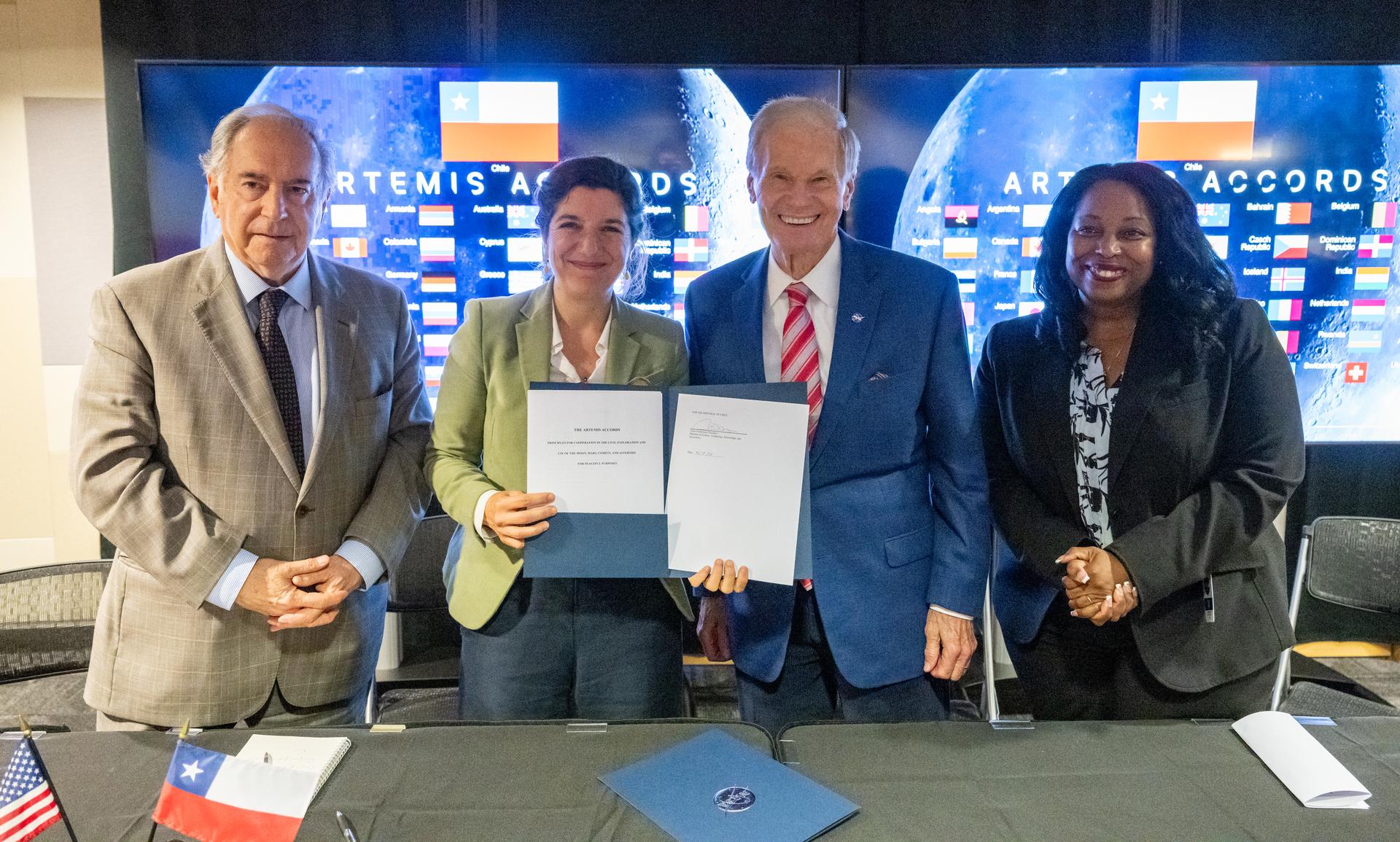Chile Joins the Global Space Initiative: Signing of the Artemis Accords
In a remarkable advancement for international collaboration in space exploration, Chile has officially signed the Artemis Accords, making it the 47th country and the seventh from South America to commit to the responsible and sustainable exploration of outer space. The signing ceremony was held at NASA’s headquarters in Washington, D.C., and was overseen by NASA Administrator Bill Nelson. This event marks a significant step forward in global efforts to explore space for the benefit of all humanity.
The Significance of Chile’s Participation
The inclusion of Chile in the Artemis Accords is a noteworthy milestone, particularly given the country’s historical contributions to astronomical studies. Chile is home to the Atacama Desert, one of the best places on Earth for astronomical observations due to its clear skies and minimal light pollution. This region has long been a site for groundbreaking astronomical research, making Chile a key player in the field of space science.
Aisén Etcheverry, Chile’s Minister of Science, Technology, Knowledge, and Innovation, represented Chile in signing the Accords. The event was also attended by Jennifer Littlejohn, acting assistant secretary for the U.S. Department of State’s Bureau of Oceans and International Environmental and Scientific Affairs, and Juan Gabriel Valdés, the Chilean ambassador to the United States.
Etcheverry highlighted the importance of this partnership for Chile, emphasizing the nation’s commitment to technological development as a cornerstone of its national strategy. She noted that Chile is poised to contribute significantly to scientific and technological projects, particularly in fields where the country has established expertise, such as astrobiology, geology, and mineralogy. These areas are crucial for the exploration and eventual colonization of space, underscoring Chile’s strategic role in the international space community.
The Broader Context of the Artemis Accords
The Artemis Accords were established in 2020, spearheaded by the United States through NASA and the U.S. Department of State, alongside seven other founding nations. The Accords are a set of principles designed to guide the peaceful and constructive exploration of space. They are grounded in the Outer Space Treaty, a foundational framework for international space law, which emphasizes the use of space for peaceful purposes, cooperation among nations, and the prevention of harmful interference in space activities.
The Accords also reference other key agreements, such as the Registration Convention, which requires countries to register their space objects to enhance transparency, and the Rescue and Return Agreement, which outlines the responsibilities of nations in the event of astronauts in distress. Additionally, the Accords promote best practices and responsible behaviors, such as the public release of scientific data to advance collective knowledge.
Recent Developments and Future Prospects
On the same day as the Chilean signing, NASA also welcomed the Dominican Republic as the 44th nation to join the Artemis Accords. The Dominican Republic’s ambassador to the United States, Sonia Guzmán, presented the signed Accords to Bill Nelson, marking another important addition to this international coalition. This growing list of signatories underscores the expanding global commitment to the principles outlined in the Artemis Accords.
The participation of more countries is expected in the near future, as the Accords continue to gain traction globally. This expansion is crucial for fostering international cooperation and ensuring that space exploration remains safe, sustainable, and beneficial for all.
Understanding the Artemis Generation
The term "Artemis Generation" refers to the new era of space exploration that the Accords aim to usher in. Named after the Artemis program, which seeks to return humans to the Moon and eventually send astronauts to Mars, this generation represents a collaborative approach to exploring space. The program not only aims to advance scientific knowledge but also to inspire a new generation of space enthusiasts and professionals.
The Artemis Generation emphasizes inclusivity and global participation, ensuring that the benefits of space exploration are shared equitably among all nations. This vision aligns with the core values of the Artemis Accords, which advocate for transparency, peaceful cooperation, and the sustainable use of outer space resources.
Chile’s Potential Contributions to Space Exploration
Chile’s entry into the Artemis Accords opens up numerous opportunities for collaboration and innovation. With its expertise in astrobiology, the study of life in the universe, Chile can contribute valuable insights into the search for extraterrestrial life. The country’s rich geological and mineralogical knowledge is also crucial for understanding the Moon’s surface and developing technologies for resource extraction, which are essential for future space missions.
Moreover, Chile’s advanced astronomical infrastructure, including world-class observatories, can play a pivotal role in space research and development. These facilities can support the Artemis program by providing critical data and analytical capabilities, enhancing our understanding of the cosmos and informing mission planning.
The Importance of International Cooperation in Space
The signing of the Artemis Accords by countries like Chile and the Dominican Republic highlights the growing importance of international cooperation in space exploration. As more nations join the Accords, the collective effort to explore space responsibly and sustainably becomes stronger. This collaboration not only advances scientific knowledge but also promotes peace and security in outer space.
International partnerships are essential for addressing the complex challenges of space exploration, such as space debris management, planetary protection, and the development of infrastructure for long-term human presence in space. By working together, countries can pool resources, share expertise, and develop innovative solutions that benefit all of humanity.
Conclusion
Chile’s signing of the Artemis Accords represents a significant step forward in international space cooperation. As the 47th nation to commit to these principles, Chile joins a growing coalition of countries dedicated to the peaceful and sustainable exploration of space. This partnership offers Chile numerous opportunities to contribute to scientific and technological advancements in space exploration, while also strengthening global efforts to ensure that space remains a domain for peaceful cooperation and mutual benefit.
For more information about the Artemis Accords and their impact on global space exploration, visit NASA’s official webpage dedicated to this initiative: Artemis Accords.
For more Information, Refer to this article.



































